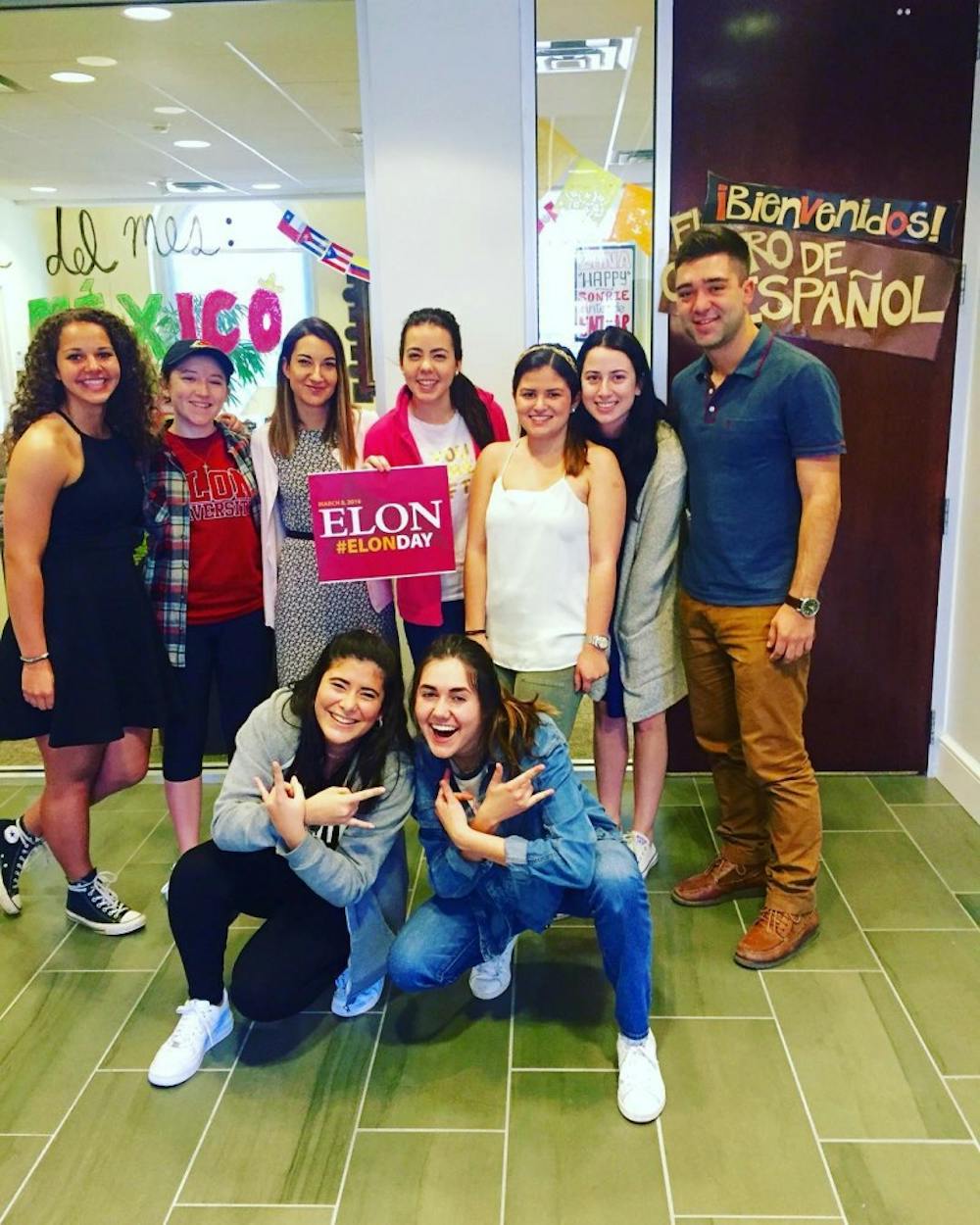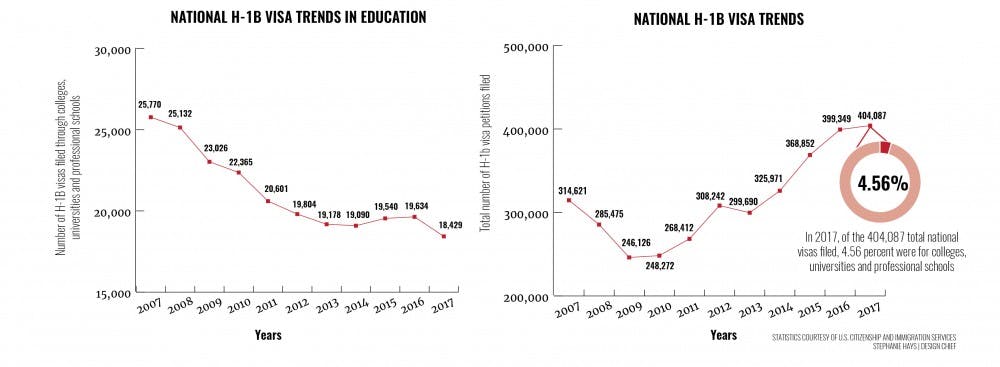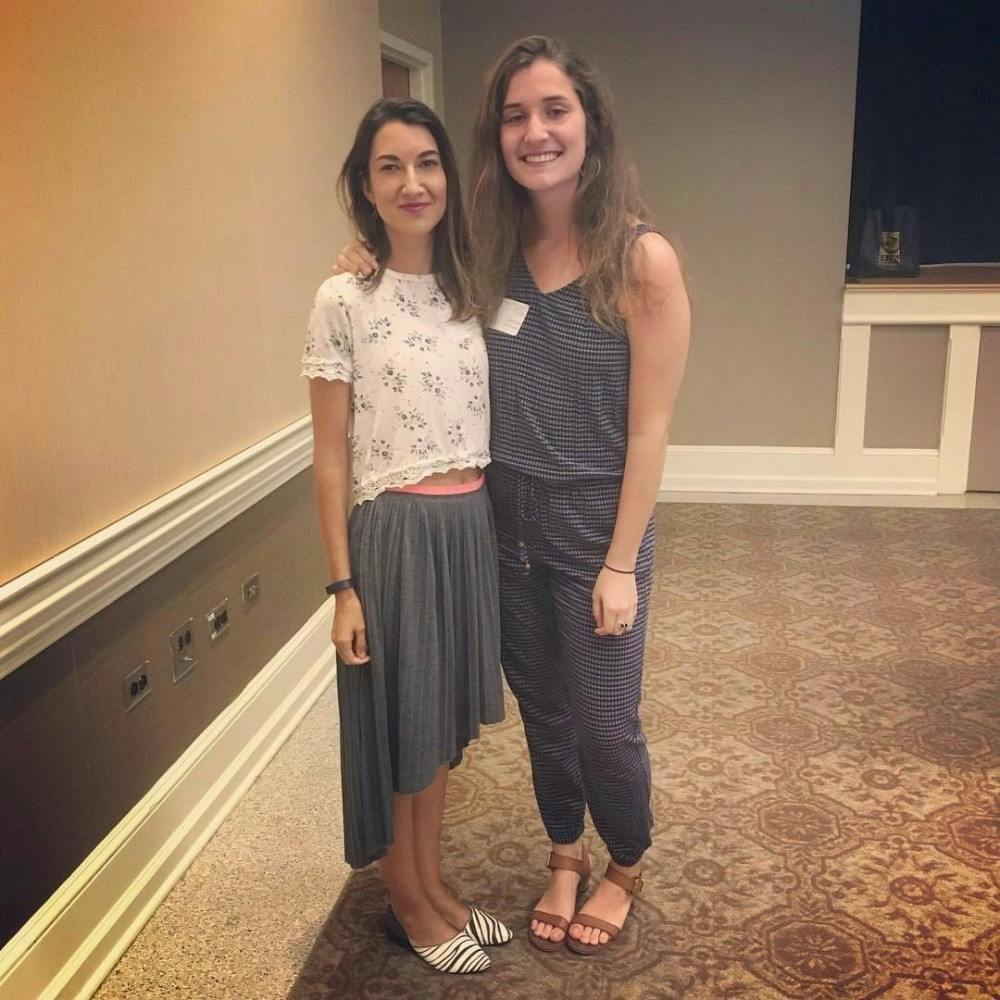
Prieto Viñas smiles with students in El Centro on Elon Day March 8, 2016. She is known for always making students feel welcomed in El Centro by encouraging participation and attending student activities outside of work hours. [ Photo submitted by Sylvia Muñoz]
If you’ve ever walked through downstairs Carlton anytime over the last five years, you’ve probably seen Diana Prieto Viñas, Assistant Director of El Centro de Español in the Center for Race, Ethnicity & Diversity Education at Elon University, through the windows of El Centro, smiling and sharing her culture with students from around campus.
But now her office is empty as she travels back to her hometown in Spain due to complications with her visa. Legally Prieto Viñas has a 30-day window to leave the country, but with no income and no health insurance, she says there’s no reason to stay.
Senior Evan Seder says when Prieto Viñas told him she was leaving, his first thought was that she was kidding, but he soon realized she was serious.
“I just didn’t really know what to say,” Seder said, “I could see in Diana’s face that she was scared, but still trying to remain optimistic.”
“Honestly, I am probably still in shock, I cannot really believe that it’s gotten to this point,” said Sylvia Muñoz, the Associate Director for the CREDE and Director of El Centro.
Prieto Viñas says she will be returning to the university for graduation as a tourist, but she is waiting to hear whether the will be allowed to come back to work for the long term.
How it happened
Prieto Viñas had been working at Elon under a J-1 visa, an exchange visitor program meant for temporary work or studies. She applied for another visa, an H-1B for special occupations, to continue working here.
The H-1B visa is intended for talented foreign workers with unique skills. The regular pool of H-1B applications had a cap of 85,000 visas for the 2017 fiscal year, most of which are issued via lottery. Because Prieto Viñas filed her petition through an institute of higher education, her application does not go through the lottery system, and is exempt from the cap.
Although overall H-1B applications have been increasing over the last ten years, the number of applications for higher education jobs have been slightly decreasing. In 2017, there were 404,087 overall applications, and petitions for jobs with colleges, universities, and professional schools made up 4.56% of those.
After the initial application, United States Citizenship and Immigration Services (USCIS) can ask for you to provide more information for your visa with a request for evidence. Prieto Viñas received one, but though she provided everything requested, she was still denied.

Frustrations Come Out
Muñoz, who has been Prieto Viñas’ friend and colleague at El Centro since Prieto Viñas started at Elon, has been spearheading the application process and is now working with the university and its lawyers to appeal the decision.
“The reasoning to me simply doesn’t make sense,” Muñoz said. "We are not going to accept reasons that don’t make any sense."
Charlotte-based immigration lawyer Daniel Christmann says he's never seen so many denials in a single year. In an email, he wrote, “This has been by far the craziest H-1B season so far. USCIS has issued many b.s. requests for evidence and denials.”
According to statistics from USCIS, requests for evidence were up 44% from the 2016 to the 2017 fiscal year.
USCIS director L. Francis Cissna issued a statement about these statistics. “This increase reflects our commitment to protecting the integrity of the immigration system.”
Cissna’s statement also emphasized that he wants to be absolutely sure petitions are approved correctly. “Increasing our confidence in who receives benefits is a hallmark of this administration and one of my personal priorities,” Cissna wrote.
Muñoz is frustrated because Prieto Viñas and the university have done everything accurately. She had believed they had a good chance of getting the H-1B visa approved in the first place.
“A person that came, and has done everything in a correct way, it shows that there is something missing, that something in the process is not working,” she said. "I think that there is a good opportunity [at winning the appeal] because again, we are doing everything correct.”
Support from the University
Christmann also said in his email that many employers just give up on sponsoring an H-1B candidate after receiving an initial denial, but Elon is continuing to fight for Prieto Viñas to stay.
The application for Prieto Viñas’ position at El Centro was competitive, with several “superb” candidates, according to Muñoz. “We want the best for our students, and Diana proved to be the best,” she said.
According to François Masuka, the Director of International Student & Faculty Scholar Services, Elon has successfully sponsored 13 faculty and staff members in the last five years. Masuka has worked at ELon since 2006, and said he's seen a few requests for evidence but never had any denials.
Prieto Viñas simply feels lucky she isn't alone. “I am very thankful to the university and the students and to my colleagues and to Sylvia [Muñoz] for supporting me for all these years," Prieto Viñas said as her eyes started to water, "and for supporting me right now when I most need it."
Leaving a Legacy at El Centro

Prieto Viñas (left) and senior Alicia Leja celebrate at Leja’s Turning 21 dinner. Leja said she would have transferred from Elon without Prieto Viñas’ support. [Photo submitted by Alicia Leja]
Before leaving the country, Prieto Viñas exchanged several tearful goodbyes with her students. They chatted on the couches and shared tres leches cake in traditional El Centro fashion.
“She’s definitely the mother of all students in a way where she’s always checking in,” said senior Alicia Leja, who frequents the non-credit conversation classes that Prieto Viñas teaches.
"Without Diana supporting me and El Centro being there, I would have transferred sophomore year," Leja said.
Several of the other students spoke to Prieto Viñas' welcoming demeanor and how much she cares about connecting individuals.
Seder recalled that one afternoon, Prieto Viñas even invited physical plant workers who wanted to learn Spanish to join their class. “She’s the reason there is such a connection between the Latinx community and the rest of the students and the staff,” Seder said.
Despite the fact that Prieto Viñas won’t be here, Leja remains positive. “When I said bye to her today, it didn’t really feel like bye, because we are still gonna talk and Facetime,” Leja said.
Muñoz never shed a tear during the entire get-together. “It’s not that I want to be in denial,” she said, “I just want to be positive that there is a system that works. And if the system really works then, she's going to be able to be back.”
Correction: A previous version of the graphic misstated the number of total national visas filed in 2017. The correct number of visas is 404,087.

